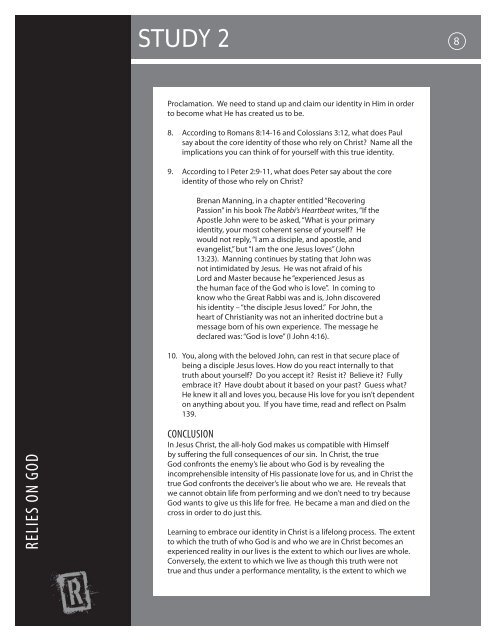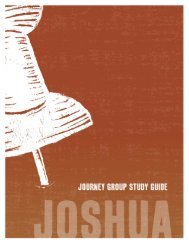R - Rely on God 6 sessions What are you relying on? - Christ ...
R - Rely on God 6 sessions What are you relying on? - Christ ...
R - Rely on God 6 sessions What are you relying on? - Christ ...
- No tags were found...
You also want an ePaper? Increase the reach of your titles
YUMPU automatically turns print PDFs into web optimized ePapers that Google loves.
STUDY 28Proclamati<strong>on</strong>. We need to stand up and claim our identity in Him in orderto become what He has created us to be.8. According to Romans 8:14-16 and Colossians 3:12, what does Paulsay about the core identity of those who rely <strong>on</strong> <strong>Christ</strong>? Name all theimplicati<strong>on</strong>s <strong>you</strong> can think of for <strong>you</strong>rself with this true identity.9. According to I Peter 2:9-11, what does Peter say about the coreidentity of those who rely <strong>on</strong> <strong>Christ</strong>?Brenan Manning, in a chapter entitled “RecoveringPassi<strong>on</strong>” in his book The Rabbi’s Heartbeat writes, “If theApostle John were to be asked, “<strong>What</strong> is <strong>you</strong>r primaryidentity, <strong>you</strong>r most coherent sense of <strong>you</strong>rself? Hewould not reply, “I am a disciple, and apostle, andevangelist,” but “I am the <strong>on</strong>e Jesus loves” (John13:23). Manning c<strong>on</strong>tinues by stating that John wasnot intimidated by Jesus. He was not afraid of hisLord and Master because he “experienced Jesus asthe human face of the <strong>God</strong> who is love”. In coming toknow who the Great Rabbi was and is, John discoveredhis identity – “the disciple Jesus loved.” For John, theheart of <strong>Christ</strong>ianity was not an inherited doctrine but amessage born of his own experience. The message hedecl<strong>are</strong>d was: “<strong>God</strong> is love” (I John 4:16).10. You, al<strong>on</strong>g with the beloved John, can rest in that secure place ofbeing a disciple Jesus loves. How do <strong>you</strong> react internally to thattruth about <strong>you</strong>rself? Do <strong>you</strong> accept it? Resist it? Believe it? Fullyembrace it? Have doubt about it based <strong>on</strong> <strong>you</strong>r past? Guess what?He knew it all and loves <strong>you</strong>, because His love for <strong>you</strong> isn’t dependent<strong>on</strong> anything about <strong>you</strong>. If <strong>you</strong> have time, read and reflect <strong>on</strong> Psalm139.RELIES ON GODCONCLUSIONIn Jesus <strong>Christ</strong>, the all-holy <strong>God</strong> makes us compatible with Himselfby suffering the full c<strong>on</strong>sequences of our sin. In <strong>Christ</strong>, the true<strong>God</strong> c<strong>on</strong>fr<strong>on</strong>ts the enemy’s lie about who <strong>God</strong> is by revealing theincomprehensible intensity of His passi<strong>on</strong>ate love for us, and in <strong>Christ</strong> thetrue <strong>God</strong> c<strong>on</strong>fr<strong>on</strong>ts the deceiver’s lie about who we <strong>are</strong>. He reveals thatwe cannot obtain life from performing and we d<strong>on</strong>’t need to try because<strong>God</strong> wants to give us this life for free. He became a man and died <strong>on</strong> thecross in order to do just this.Learning to embrace our identity in <strong>Christ</strong> is a lifel<strong>on</strong>g process. The extentto which the truth of who <strong>God</strong> is and who we <strong>are</strong> in <strong>Christ</strong> becomes anexperienced reality in our lives is the extent to which our lives <strong>are</strong> whole.C<strong>on</strong>versely, the extent to which we live as though this truth were nottrue and thus under a performance mentality, is the extent to which we



